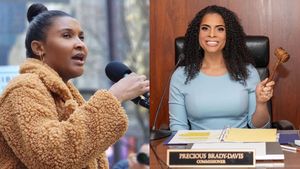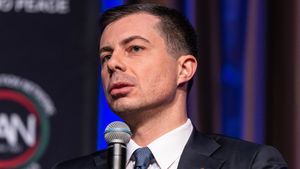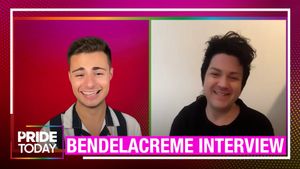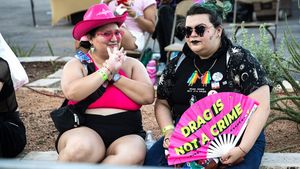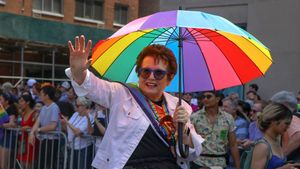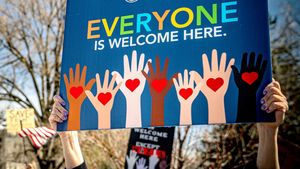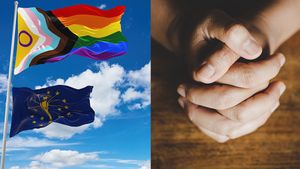All Rights reserved
By continuing to use our site, you agree to our Privacy Policy and Terms of Use.
Stephanie Beatriz is intimately familiar with the power of media representation. Growing up, she was inspired to become an actor by Daphne Rubin-Vega, who was the first Latina on Broadway she connected with. Now, because the universe has a wonderful sense of humor, she's starring as Rubin-Vega's partner in what's sure to be the movie of the summer, Jon M. Chu's In the Heights, based on Lin-Manuel Miranda and Quiara Alegria Hudes's Tony Award-winning musical about a Latinx community in Manhattan's Washington Heights neighborhood.
"The soundtrack of Rent [in which Rubin-Vega played Mimi] really provided me a doorway in to see the musical," Beatriz remembers. "My family didn't have money to go take a trip to New York so I could see a Broadway show, but I could get the soundtrack at the library and listen to it over and over."
Unlike in the stage version of In the Heights, in the film, Beatriz's character Carla is in a lesbian relationship with Daniela (Rubin-Vega), the owner of the salon she works at. For Beatriz, it was a full-circle moment.
"I grew up with a poster of [RubinVega] on my wall," the bisexual actress confesses. "I had the cover of Newsweek that she was on with Adam Pascal taped to the back of my door in high school. And to me, she's really legendary. So to make the jump as an actor to being in love with her was not hard for me at all, because she's charming, very distinct, specific, beautiful."
Trending stories
Beatriz adds, "I layered that in as much as I could, especially if Daniela is talking." So it wasn't difficult for Beatriz to portray her character Carla as "enraptured, glued, like it's a master class, just watching it all unfold, watching Daniela's personality take over the space of a room and the ambiance."
She continues, "Any time Daniela might have a doubt, it's Carla who steps up to the plate and tells her, whether it's in her ear or out loud to everyone in the room, 'You got this.' I just loved that very much because I think that's a real characteristic of a healthy relationship -- one in which your partner sees the possibilities in you, sometimes when you don't even see them yourself, believes that you are incredible, amazing, talented, the Lady Gaga list."
Beatriz is especially excited to play a queer character in a movie where there's no homophobia. When you see scenes with Carla and Daniela together, especially in the salon, you see, "lots of different shades of people, lots of different shapes of people, and different sexualities, and different expressions of self. That's a safe space," she says. "I think in many communities, the beauty parlor is a safe space, especially in Latino communities."
It's refreshing for the film to invite viewers into the life Daniela and Carla have created where everyone around them is accepting, "whether or not we know about their extended families is not the point of this," Beatriz says.
"It's really the family that they've created, the home that they've created in Washington Heights, is an accepting, loving place where they thrive."
That's a way of building family that Beatriz understands. "This movie is a celebration of a specific neighborhood in New York City and the people that inhabit it, but in its specificity, it becomes this universal story about what it means to define family and belonging at home," she says. "That is something I think, no matter where you come from, you have an attachment to home and family. Whether that's the home that you grew up in or the home that you've created for yourself, everybody wants the feeling of belonging."
The actress acknowledges, "as somebody who didn't always have the strongest connection to my family, I know what it's like to build your own family. To collect people, friends, [and] mentors around you and build yourself this safety net, and I think that's what is so clear in In the Heights, like your family really is your safety net."
Beatriz knows that that message of family will connect to audiences of all generations and beliefs. In her own life, she's seen how media can create a bridge between not just generations, but languages. After her character Rosa Diaz came out to her parents on an episode of Brooklyn Nine-Nine, Beatriz's own father texted her, "I just want you to know, I love you no matter what," quoting her character's father on the show.
"I mean, my dad speaks fluent English, but he doesn't always speak fluent emotion and was able to translate his emotions through what he saw and give it back to me," she remembers. She hopes In the Heights can serve as that translator for others. As an immigrant herself, she knows how much colonialism and religion have shaped many Latinx people, especially when it comes to LGBTQ+ issues.
"There's a disconnect there for some people, and generationally it kind of affects people that are a little bit older much more because they feel like, well, this is my faith and that's a huge part of me, and yet my faith tells me that I cannot accept my child because they've come out to me as gay, as lesbian, as queer, as trans," she says. "But I do think that it's shifting and changing."
\u201clove you #InTheHeightsMovie and all the hardworking cast and crew\u2026.crafts women and men that also had countless sleepless nights and made you who you are. In a couple days, ur free to become whatever you want and we will continue to love you regardless.\u201d— Jon M. Chu (@Jon M. Chu) 1623157096
She sees the film as helping that shift occur. "One of the things that art does really well is that it creates these pathways for conversation and social change and societal change and shift that you might not be able to have it if you were to, for example, sit down one-on-one and talk with your abuela," she says. "But now that might be able to happen if the two of you sit together in a dark theater and watch a film that you both enjoy, and love and laugh at and cry at and feel a connection to the characters."
The conversation that moment might spark, Beatriz says, can be like a seed "planted there and [it] can be tended, and it can grow over many conversations that are still to be had. That's one of the greatest gifts that art gives us. It ignites in us the desire to discuss that art with our fellow human beings."
She adds, "I think that's what's really thrilling for me about In the Heights. There's so many things I think that will be sparked by this film, in families and friend relationships, in love relationships, in people that have seen the movie and want to talk about it together."
In the Heights premieres in theaters and on HBO Max on Thursday, June 10.
This story is part of Out's 2021 Pride Issue, which is on newsstands on now! To get your own copy directly, support queer media and subscribe -- or download yours for Amazon, Kindle, Nook, or Apple News.
Latest Stories
'Drag Race': Snatch Game winners and the celebs they impersonated
BenDeLaCreme reveals if she'd like to return to 'RuPaul's Drag Race All Stars'
These 'Drag Race' queens won 4 maxi challenges (or more!)
California defies Trump, won't ban trans athletes from school sports
The Old Guard's Charlize Theron and cast on centuries-old same-sex love stories
Porkchop Queens: All first-eliminated queens from 'RuPaul's Drag Race'
'Superman': Nicholas Hoult 'felt warm and safe' in David Corenswet's arms
Sniffies now allows all users to explore cruising opportunities across the globe
The 50th Invasion of the Pines: See pics of queer joy & drag
'Drag Race All Stars 10' Snatch Game: Questions, reactions, & results
Recommended Stories for You

Mey Rude
Mey Rude is a journalist and cultural critic who has been covering queer news for a decade. The transgender, Latina lesbian lives in Los Angeles with her fiancée.
Mey Rude is a journalist and cultural critic who has been covering queer news for a decade. The transgender, Latina lesbian lives in Los Angeles with her fiancée.










